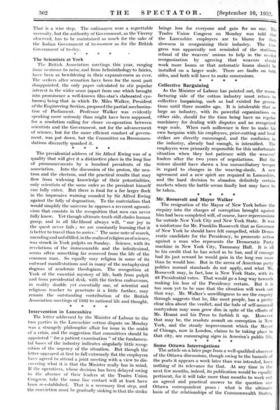The presidential address of Sir Alfred Ewing was of a
quality that will give it a distinctive place in the long line of pronouncements by a hundred presidents of the association. Into the discussion of the proton, the neu- tron and the electron, and the practical results that may flow from widening knowledge of their potentialities, only scientists of the same order as the president himself can fully enter. But there is food for a far larger flock in the impressive warning sounded by Sir Alfred Ewing against the folly of dogmatism. To the materialism that would simplify the universe he opposes a reverent agnosti- cism that consists in the recognition that men can never fully know. Yet though ultimate truth still eludes human grasp, and in all likelihood always will, "our joy in the quest never fails ; we are constantly learning that it is better to travel than to arrive." The same note of search, unending and unfulfilled, in the realm of religion as of science, was struck in York pulpits on Sunday. Science, with its revelations of the immeasurable and the infinitesimal, seems often something far removed from the life of the common man. So equally may religion in some of its outward manifestations and in many of the metaphysical dogmas of academic theologians. The recognition at York of the essential mystery of life, both from pulpit and from presidential desk, with the tireless endeavours, in reality double yet essentially one, of scientist and religious teacher to penetrate it a little further, may remain the outstanding contribution of the British Association meetings of 1932 to national life and thought.






























 Previous page
Previous page